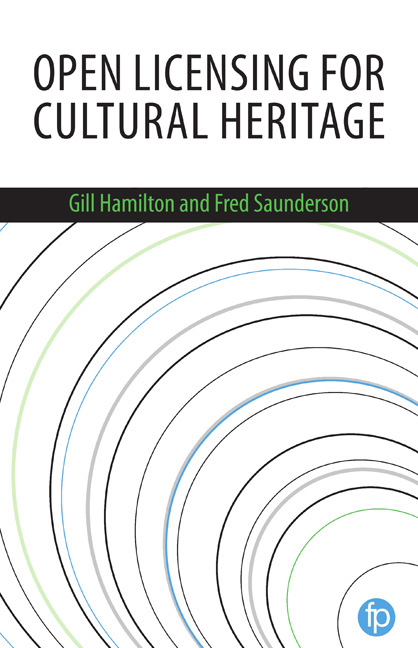Book contents
- Frontmatter
- Contents
- List of figures and tables
- Acknowledgements
- About the authors
- 1 Introduction
- 2 The open movement: its history and development
- 3 Copyright and licensing: a background
- 4 Open licensing: the logical option for cultural heritage
- Introduction to case studies
- 5 Small steps, big impact – how SMK became SMK Open
- 6 The British Library experience of open metadata licensing
- 7 Open policy and collaboration with Wikimedia at the National Library of Wales
- 8 Newcastle Libraries – the public library as a place to share culture
- 9 Developing open licensing at the National Library of Scotland
- 10 The Wellcome Library
- 11 Developing an open educational resources policy and open approaches to mitigate risk at University of Edinburgh
- 12 How to implement open licensing
- 13 Using and reusing openly licensed resources
- 14 Conclusion
- Index
2 - The open movement: its history and development
Published online by Cambridge University Press: 08 June 2018
- Frontmatter
- Contents
- List of figures and tables
- Acknowledgements
- About the authors
- 1 Introduction
- 2 The open movement: its history and development
- 3 Copyright and licensing: a background
- 4 Open licensing: the logical option for cultural heritage
- Introduction to case studies
- 5 Small steps, big impact – how SMK became SMK Open
- 6 The British Library experience of open metadata licensing
- 7 Open policy and collaboration with Wikimedia at the National Library of Wales
- 8 Newcastle Libraries – the public library as a place to share culture
- 9 Developing open licensing at the National Library of Scotland
- 10 The Wellcome Library
- 11 Developing an open educational resources policy and open approaches to mitigate risk at University of Edinburgh
- 12 How to implement open licensing
- 13 Using and reusing openly licensed resources
- 14 Conclusion
- Index
Summary
Introduction
This chapter explores the background, history and development of the open movement. It explains that the beginnings of the movement can be traced to the early days of digital computing and open source software, and that the role of free access to government information and the founding of the web have significantly influenced the movement. It looks at the history of open government, open access, open education, open data and organisations that advocate for openness.
Openly sharing our knowledge, experience, content and culture for free is not a new idea or concept. Sharing is an innate and natural part of our human charac - ter. We take this sharing for granted and most of the time pay it little attention. Take a moment to look and listen and you will see that you are completely surrounded by the products and outputs of our shared intelligence and experience:
• the building you are sitting in is based on architectural principles outlined by the ancient Greek architect and historian Vitruvius
• a child, friend or partner is excitedly telling you about their new idea to change the world as we know it
• the book or screen you are reading this text from is either a technology with its foundation in the invention of movable type or a modern semiconductor and LCD device – both capable of helping us, your authors, share with you what we know about open licensing.
Human endeavour is based on the exchange of information. To borrow from Sir Isaac Newton, we stand on the shoulders of those giants who shared before us.
Of course, not all information sharing is open. We have legal frameworks, including copyright, patents and information security laws that limit or prevent the open exchange of information and content. These tools protect the intellectual property and data rights of creators, as well as individuals, organisations and nation states more broadly. The intellectual creations within this book are protected by UK copyright legislation, safeguarding our work as authors against copying, and limiting your ability to use and reuse our intellectual output without first seeking our permission.
- Type
- Chapter
- Information
- Open Licensing for Cultural Heritage , pp. 7 - 30Publisher: FacetPrint publication year: 2017



